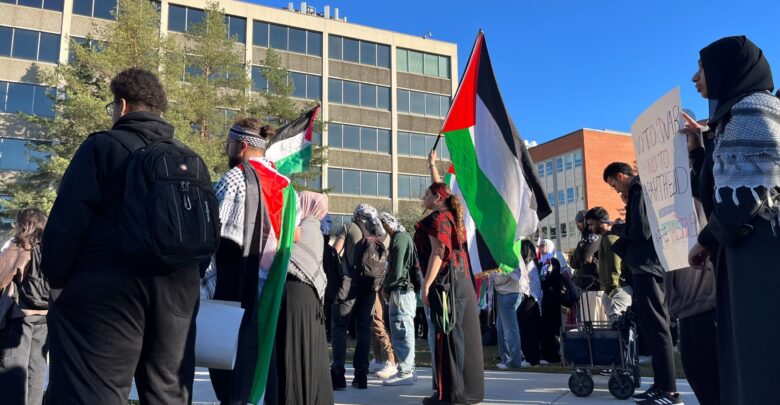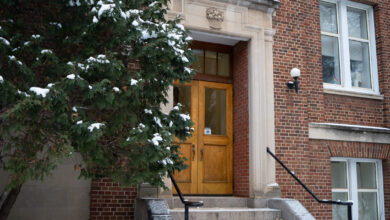U of A administration is standing by while students are being murdered
Palestinian students have earned their spots at the U of A. Now they’re being bombed, starved, and abandoned while the processing of their visas are delayed.
 Katie Teeling
Katie TeelingDisclosure: The three authors of this article are members of Students for Justice in Palestine at the University of Alberta.
Students from Gaza have gained admission to various Master’s and PhD programs at the University of Alberta and have secured extensive funding to support their studies. However, Immigration, Refugees and Citizenship Canada (IRCC) has needlessly delayed and prevented Palestinian students from coming to this country to exercise their human right to education. A right they cannot exercise currently, as all 12 universities in Gaza have been reduced to rubble by Israeli bombardment.
These delays are a nationwide issue. There are at least 70 confirmed Palestinian students from Gaza who have fulfilled every requirement for study visa approval and have every right to enter the country. However, they face an agonizing bureaucratic process. Reem Haadaqa, who was injured in an Israeli airstrike that killed her parents and two sisters, completed her last degree while living in a tent in al-Mawasi after the occupation forces destroyed her home. She has been accepted to pursue a degree in translation studies at the U of A. Tawfiq Abed is a 19-year-old from Gaza City, which is now facing escalated destruction. He earned admission to study engineering. Despite the fall term being well underway, both Reem and Tawfiq, along with their peers, remain trapped in Gaza.
Other countries have demonstrated the will to aid these students in their applications and subsequent migrations, including Germany and France. However, Canada has not demonstrated this same will. The country operates under the claim that they cannot collect biometric data — photos and fingerprints — within Gaza to complete the visa applications. According to the Palestinian Students and Scholars At Risk Network, a third of the total 70 Gazan applicants are not even in Gaza. They have fled Israel’s genocidal campaign to Egypt and Jordan, where the Canadian government has embassies and support.
The IRCC is simply letting visa applications from Gaza collect dust. Something they did not do when Ukrainian and Syrian students needed extra support in receiving student visas.
The conditions of students in Gaza waiting to evacuate are perilous. One tragic example is the case of twin sisters Sally and Dalia Ghazi Ibaid. The University of Waterloo had accepted both sisters into its Systems Design Engineering PhD program. They were bright, promising young students who had earned their place to work, learn, and collaborate with other University of Waterloo students. Before they could leave Gaza, Israel killed them both in an airstrike last December.
Each day that the IRCC needlessly delays processing student visa applications, students in Gaza remain at risk of being maimed or killed. Palestinian students are desperately waiting for their visas after securing spots in the U of A’s prestigious programs. All while mourning their lost loved ones and fighting for survival.
After two years of witnessing and experiencing ongoing genocide, students who remain in Gaza face increasingly unbearable conditions. Rates of death by starvation and malnourishment have grown exponentially in the Occupied Gaza Strip. The World Health Organization (WHO) has reported that all 2.1 million Gazans who have not yet been killed are food insecure, lacking the necessary calories and nutrition to sustain life. The few who can still stand despite their starvation risk death at aid distribution sites.
In fact, since late May, more than 1,000 Palestinians have been shot and killed by Israeli forces at aid sites. Aid sites run by the Gaza Humanitarian Foundation, an American nonprofit that receives only the small amount of food Israel allows into Gaza. This is a man-made famine, generated by the Israeli government’s blockade of the Gaza Strip. The Canadian government continues to arm Israel with weapons to destroy Gaza. It also continues to stand idly by while Palestinian students try to flee.
These visa delays not only put these students in increased danger. They also deprive the U of A community of future doctors, nurses, educators, and scientists. The university prides itself on its large international student population, world-class education, and global partnerships. The community of students, faculty, staff, administration, and alumni must implore the Canadian government to expedite their applications and secure their safe passage to our campus. This is especially so if we are to maintain our reputation for supporting displaced students and scholars.
The U of A’s position as a top five university in Canada, and a top 100 university globally, gives it an inordinate amount of influence. We must use this influence to help those in need. In the past, President Bill Flanagan has boasted about the university’s commitment to supporting Ukrainian students and scholars in public-facing forums like The Quad. But when it comes to Palestinian students, he has provided no such updates, despite offering funding for displaced scholars in light of Israel’s ongoing assault against Gaza. Why isn’t the university updating us on this fund, and the students it is awarding it to? Why aren’t officials assuring us of their safety? That they have actually been able to join the U of A community in full, the way the university has updated us for other displaced groups?
The U of A has an increased responsibility in this issue. We have admitted many of the Palestinian students who have applied to study in Canada. These students gained admission to our university even as bombs fall, hunger spreads, and they face gunfire and military technology. Technology that the U of A funds and develops with its investments in weapons manufacturers like Rolls Royce and Magellan and research centres in aerospace, defence, and dual-use technologies.
As a member of the U of A community, there are a few things you can do to help the cohort of Palestinian students admitted to the university. You can contact your member of parliament (MP) and Minister of Immigration, Refugees, and Citizenship Canada Lena Diab to demand that the visa applications of all Palestinian students admitted to the U of A be processed in a timely and just manner so that these students may begin their studies this academic year.
You can contact Provost Verna Yiu and demand that the university extend admission and decision deadlines for these Palestinian students. This will help keep their scholarship and admission offers from expiring while the IRCC processes their applications. The university should also uphold its four-year commitment to the Displaced Palestinian Student Bursary Program, regardless of when student visas are processed.
You can also contact President Bill Flanagan and demand that the university issues a public statement of support for admitted Palestinian students and the Displaced Palestinian Student Bursary Program.
Our university campus will be a much brighter place with these students part of it. More than that, however, the world will be a brighter place with every Palestinian life we can save. This is just one, out of many, ways we can preserve such lives.




